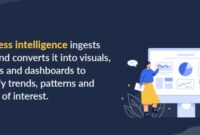What business intelligence – What is business intelligence? It’s the key to unlocking data-driven insights that empower businesses to make informed decisions, optimize operations, and gain a competitive edge. Join us as we delve into the world of BI, exploring its types, benefits, components, and the future trends shaping this transformative technology.
Business intelligence (BI) is the process of transforming raw data into meaningful and actionable information. This information can be used to improve decision-making, increase efficiency, and gain a competitive advantage.
According to business intelligence statistics , the BI market is expected to grow to $30.1 billion by 2025.
This growth is being driven by the increasing need for businesses to make data-driven decisions.
Business intelligence has revolutionized the way organizations leverage data to drive success. From descriptive analytics to predictive modeling,
BI empowers businesses to make sense of complex data, identify trends, and forecast future outcomes. By understanding the fundamentals of business intelligence, you’ll gain a deeper appreciation for its transformative potential.
Definition of Business Intelligence (BI)
Business intelligence (BI) is a set of technologies and processes that organizations use to collect, store, analyze, and visualize data to improve decision-making.
BI systems provide insights into an organization’s performance, customers, and market trends, enabling businesses to make better decisions, increase efficiency, and gain a competitive advantage.
Examples of BI applications include:
- Identifying customer trends and preferences
- Forecasting sales and demand
- Optimizing supply chain management
- Improving risk management
- Identifying fraud and compliance issues
Types of Business Intelligence
There are three main types of BI:
- Descriptive BI: Provides insights into past and present performance, answering questions like “What happened?” and “Why did it happen?”
- Predictive BI: Uses historical data to forecast future trends and outcomes, answering questions like “What is likely to happen?”
- Prescriptive BI: Provides recommendations and actions to improve future outcomes, answering questions like “What should we do?”
Each type of BI has its own advantages and disadvantages:
- Descriptive BI: Easy to implement and understand, but limited in scope.
- Predictive BI: More complex to implement, but can provide valuable insights into future trends.
- Prescriptive BI: Most complex to implement, but can provide the most actionable insights.
Benefits of Business Intelligence, What business intelligence

Organizations that implement BI can experience a number of benefits, including:
- Improved decision-making: BI provides insights that help businesses make better decisions, based on data rather than intuition.
- Increased efficiency: BI can help businesses identify and eliminate inefficiencies, leading to increased productivity and cost savings.
- Enhanced customer satisfaction: BI can help businesses understand their customers’ needs and preferences, leading to improved customer service and satisfaction.
Here are a few case studies that demonstrate the benefits of BI:
- Walmart used BI to identify customer trends and preferences, which led to increased sales and improved customer satisfaction.
- Amazon uses BI to forecast sales and demand, which helps them optimize their inventory levels and reduce costs.
- General Electric uses BI to improve risk management, which has helped them avoid costly accidents and lawsuits.
Components of Business Intelligence Systems

BI systems typically consist of the following components:
- Data sources: The data that is used by the BI system can come from a variety of sources, such as internal databases, external data sources, and social media.
- Data warehouse: A data warehouse is a central repository for all of the data that is used by the BI system.
- Reporting tools: Reporting tools allow users to create reports and visualizations that can be used to analyze the data and gain insights.
These components work together to provide businesses with the insights they need to make better decisions.
Business intelligence (BI) encompasses a wide range of tools, technologies, and practices used to transform raw data into meaningful insights.
To delve deeper into the significance of BI, let’s explore the business intelligence meaning. Understanding the definition and scope of BI is crucial for organizations seeking to leverage data to drive informed decision-making and improve overall business outcomes.
Challenges in Implementing Business Intelligence
Organizations may face a number of challenges when implementing BI, including:
- Data integration: Integrating data from multiple sources can be complex and time-consuming.
- Security concerns: BI systems can contain sensitive data, so it is important to ensure that they are secure.
- User adoption: Getting users to adopt and use BI systems can be challenging.
There are a number of strategies that organizations can use to overcome these challenges:
- Data integration: Use data integration tools to automate the process of integrating data from multiple sources.
- Security concerns: Implement strong security measures to protect the data in BI systems.
- User adoption: Provide training and support to users to help them adopt and use BI systems.
Future Trends in Business Intelligence
The future of BI is bright, with a number of emerging trends that will shape the way businesses use BI in the years to come.
Business intelligence involves gathering and analyzing data to gain insights into business performance. However, it’s also crucial to consider emotional intelligence in business, as it helps leaders understand and manage their own emotions and those of others.
By fostering emotional intelligence , businesses can create a positive work environment, improve communication, and make better decisions.
Ultimately, business intelligence provides valuable data, but emotional intelligence helps businesses leverage that data effectively.
- Artificial intelligence (AI): AI will be used to automate many of the tasks that are currently performed by BI analysts, freeing them up to focus on more strategic initiatives.
- Cloud computing: Cloud computing will make BI more accessible and affordable for businesses of all sizes.
- Self-service analytics: Self-service analytics tools will empower business users to access and analyze data without the need for IT support.
These trends will make BI more powerful and accessible than ever before, enabling businesses to gain even greater insights from their data.
Wrap-Up
In conclusion, business intelligence has emerged as an indispensable tool for businesses seeking to harness the power of data. Its ability to provide actionable insights, streamline operations, and drive informed decision-making makes it a cornerstone of modern business strategy.
As technology continues to advance, the future of BI holds even greater promise, with emerging trends like AI and self-service analytics poised to further revolutionize the way we use data to drive business success.
FAQ Guide: What Business Intelligence
What are the different types of business intelligence?
Business intelligence encompasses various types, including descriptive analytics, which provides insights into past performance; predictive analytics, which forecasts future trends; and prescriptive analytics, which recommends actions based on data analysis.
What are the benefits of implementing business intelligence?
BI offers numerous benefits, such as improved decision-making, increased efficiency, enhanced customer satisfaction, and optimized resource allocation.
What are the challenges in implementing business intelligence?
Common challenges include data integration, security concerns, user adoption, and the need for skilled professionals to manage and interpret data.




